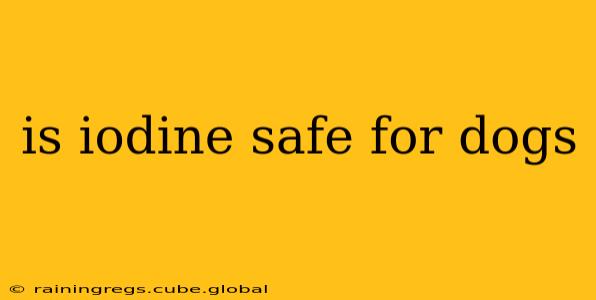Iodine is an essential trace mineral for humans and animals, playing a crucial role in thyroid hormone production. However, the safety of iodine for dogs depends heavily on the form, amount, and method of administration. While a small amount of iodine is necessary for canine health, excessive iodine intake can lead to serious health problems. This guide will explore the various aspects of iodine and its implications for canine health.
What are the different forms of iodine?
Iodine exists in several forms, each posing different levels of risk to dogs. Understanding these differences is critical in assessing its safety.
- Iodine in dog food: Commercial dog foods typically contain iodine in trace amounts, carefully regulated to meet canine nutritional needs. This is generally considered safe.
- Iodine supplements: These should only be given under strict veterinary guidance. Improper dosage can cause serious issues.
- Household iodine products: This includes disinfectants, antiseptics, and certain medications containing iodine. These are highly toxic to dogs if ingested and should be kept well out of reach. Even topical application can be dangerous if licked.
- Iodized salt: While small amounts are unlikely to cause immediate harm, regular consumption of large quantities of iodized salt can lead to iodine toxicity.
What are the symptoms of iodine toxicity in dogs?
The symptoms of iodine toxicity can vary depending on the severity of exposure and the form of iodine ingested. Some common signs include:
- Vomiting and diarrhea: These are often among the first symptoms.
- Excessive drooling: This is a response to irritation of the gastrointestinal tract.
- Lethargy and weakness: Iodine toxicity can impact energy levels significantly.
- Loss of appetite: Reduced food intake is a common symptom of many forms of toxicity.
- Fever: This indicates the body's inflammatory response.
- Tremors and seizures: These are severe symptoms indicative of significant toxicity.
- Skin irritation: Topical exposure can cause redness, itching, and inflammation.
What happens if my dog ingests iodine?
If you suspect your dog has ingested iodine, even a small amount from a potentially toxic source, contact your veterinarian immediately. Time is of the essence in treating iodine poisoning. Do not attempt to induce vomiting or administer any home remedies without professional guidance; this could worsen the situation. Your vet will likely conduct tests to determine the extent of iodine exposure and recommend appropriate treatment, which might include supportive care like fluid therapy to flush the system.
Can iodine deficiency affect dogs?
While iodine toxicity is a concern, iodine deficiency is also possible, though less common than toxicity. A deficiency can lead to hypothyroidism, which can manifest as lethargy, weight gain, hair loss, and reproductive issues. However, iodine deficiency is usually diagnosed through blood tests by a vet and addressed with appropriate supplementation only under veterinary supervision.
What should I do to prevent iodine poisoning in my dog?
Preventing iodine poisoning is far easier than treating it. Here are some crucial preventative measures:
- Secure household iodine products: Keep all disinfectants, antiseptics, and medications containing iodine out of your dog's reach.
- Monitor your dog's access to iodized salt: Prevent your dog from consuming excessive amounts of iodized salt.
- Choose appropriate dog food: Opt for high-quality commercial dog food that meets your dog's nutritional needs; it will have the correct levels of iodine.
- Never administer iodine supplements without veterinary advice: Iodine supplementation should only be done under the strict guidance of your veterinarian.
In summary, while iodine is essential for canine health in appropriate amounts, it can be incredibly dangerous if ingested in excess or in the wrong form. Always prioritize veterinary advice when dealing with iodine and your dog's health. Prevention is key to ensuring your furry friend remains safe and healthy.
